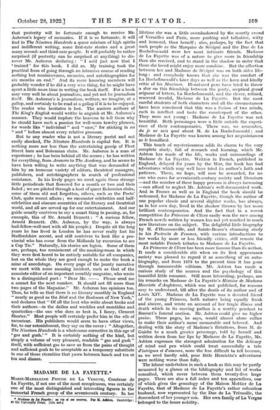MADAME DE LA FAYETTE.* MARIE-MADELEINE PIOCHE DE LA V3E:nu:NE, Comtesse
de La Fayette, if not one of the most conspicuous, was certainly one of the most distinguished and interesting figures in the immortal French group of the seventeenth century. In her • Madame 4 Ls Fayette vie d ass oeuvres, Peg H. Ashton, Cambridge : at the University Prem, [26a. net.]
lifetime she was a little overshadowed by the courtly crowd of Versailles and Paris, more pushing and talkative, witty
and immoral, than herself ; also, perhaps, by the fact that such people as the Marquise de Svign6 and the Due de La Rochefoucauld were her most intimate friends. Madame de La Fayette was of a nature to give more in friendship than she received, and to stand in the shadow in order that those she loved might enjoy more sunshine. But the affection between her and Madame de Sevigne was on both sides life- long : and everybody knows that she was the comfort of La Rochefoucauld's later days as well as the keen and kindly critic of his Maximes. Ill-natured pens have tried to throw a slur on this friendship between the gouty, sceptical grand seigneur of letters, La Rochefoucauld, and the clever, refined, reserved invalid, Madame de La Fayette. But the most careful students of both characters and all the circumstances have been convinced that this was a liaison of two minds, each in intellect and taste the counterpart of the other. They were not young : Madame de La Fayette was not beautiful. Both personages were a little outside the experi- ence of their contemporaries. There was, we remember, du je ne sais quoi about M. de La Rochefoucauld ; and Madame de La Fayette was known among her acquaintances as le brouillard.
This touch of mysteriousness adds its charm to the very complete study, full of research and learning, which Mr. Ashton has made of the life, works and surroundings of Madame de La Fayette. Written in French, published in England, delayed for years by the War, the book has had adventures which may well have tried its author's faith and patience. These, we hope, will now be rewarded, for no one who cares for seventeenth-century society and literature —and the number of these happy persons is always increasing —can afford to neglect Mr. Ashton's well-documented work. And in France as well as in England the book should be welcomed, for Madame de La Fayette, though the author of one popular classic and several slighter works, has always, as in her own day, lived in the shadow thrown by her more brilliant contemporaries. And the fact that in a recent competition La Princcsse de Cleves easily won the race among French novels written by women has not yet resulted in much new literature on the subject. The delightful little biography by M. d'Haussonville, and Sainte-Beuve's charming study in his Portraits de Femmes, with various introductions to her works by more or less friendly critics, still remain the most notable French tributes to Madame de La Fayette.
La Princesse de Cleves has been more famous than its author. It made a considerable stir when on its first appearance society was pleased to regard it as something of an auto- biography, and from 1678 to the present time it has gone through innumerable editions. Mr. Ashton has made a curious study of the sources and the psychology of this beautiful little romance. Still more interesting, perhaps, are his remarks on Madame de La Fayette's Histoire de Madame Henriette d'Angleterre, which was not published, for reasons easy to understand, till after the death of its author and of Louis XIV. Madame de La Fayette was a devoted friend of the young Princess, both natures being equally frank and sincere, and wrote an account of her tragic illness and death which in its moving pathos is a worthy pendant to Bossuet's funeral oration. Mr. Ashton could give no higher praise. These pages, he says, would almost alone suffice to make their author's name memorable and beloved. And dealing with the story of Madame's flirtations, from M. de Guiche to a much greater personage, told by herself and written down from her lips by Madame de La Fayette, Mr. Ashton expresses the strongest admiration for the delicacy of mind and pen which could treat successfully a tale d'intrigues a d'amours, none the less difficult to tell because, as we need hardly add, poor little Henriette's adventures were nothing worse than folly.
The labour undertaken in such a book as this may be partly measured by a glance at the bibliography and list of works consulted, which cover between them twenty-five large pages. There are also a full index and ten appendices, one of which gives the genealogy of the Maison Mottier de La Fayette, that of Madame de La Fayette's rather colourless husband, now represented by the Due de La Tremoille, the descendant of her younger son. Her own family a3f f.a Vergue belonged to the lesser nobility.










































 Previous page
Previous page